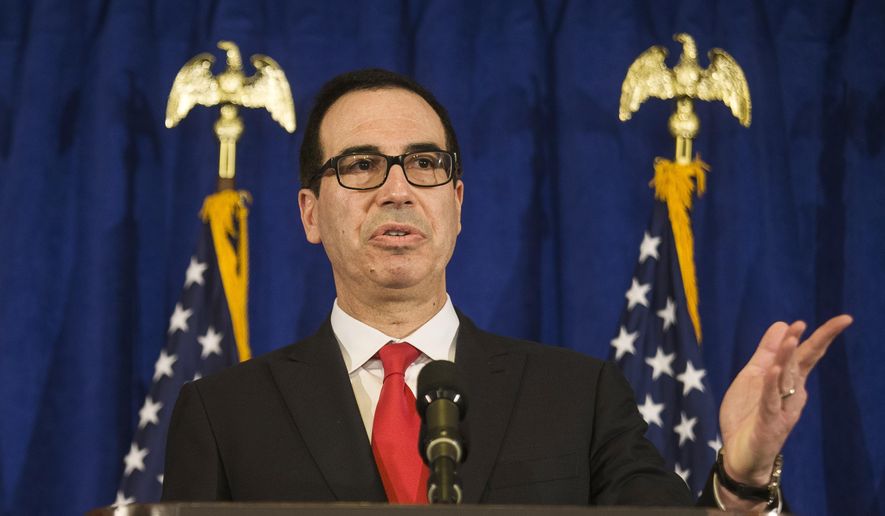Treasury Secretary Steven Mnuchin said the president’s tax plan revealed last week is a “jobs bill” and doesn’t benefit the rich, fighting back against criticism from Democrats who say the plan mostly benefits the wealthy.
“As we release the details of the plan, we will show all the different impacts to the people,” Mr. Mnuchin told ABC’s “This Week” on Sunday. “This has impact to different people in different states.”
Mr. Mnuchin said giving a break to businesses will help them grow capital and create jobs.
The Treasury secretary admitted that the estate tax would be cut, but said the administration is focused on changes to the income tax system, not the so-called death tax.
“We believe that people get taxed once and not twice and that will enable to keep lots of family businesses passed along,” said Mr. Mnuchin.
The estate tax is a levy on property that is transferred to a beneficiary after the owner dies, and applies to estates valuing more than $5.49 million.
But Sen. Bernard Sanders says his Democratic colleagues won’t support the Republican plan because it gives tax breaks to the wealthy and corporations while cutting Medicare.
“For Trump to go on television and say, ‘Oh, this doesn’t benefit the wealthy’ is absolutely outrageous,” the Vermont independent said Sunday on CNN’s “State of the Union.”
Senate Minority Leader Charles E. Schumer, New York Democrat, said he and his Democratic colleagues sent a letter to the president and Republican leadership, saying tax reform must not give tax breaks to the top 1 percent, it must be bipartisan and it can’t blow a hole in the deficit.
“Unfortunately, the Republican plan doesn’t agree with any of those. First, it’s completely focused on the wealthy and the powerful — not on the middle class. Second, it blows a huge hole in the deficit,” said Mr. Schumer on CBS “Face the Nation” on Sunday.
The debate over who will benefit from tax reform comes after Republicans revealed their plan earlier last week. Under the plan, the small business tax rate would be lowered to 25 percent and the corporate tax rate would be lowered from 35 percent to 20 percent.
Mick Mulvaney, director of the Office of Management and Budget, says the administration’s tax plan is only a framework for Congress, which will work out the details like deductions and brackets.
“This really is about the middle class and the corporate tax rate for the president,” Mr. Mulvaney told CNN.
He said 90 percent of American families pay someone else to do taxes and that must end.
Nevertheless, Republicans remained optimistic about their chances of passing a tax bill on Sunday’s political talk shows, with House Speaker Paul D. Ryan saying the party has not repeated the mistakes that doomed its efforts on health care.
Mr. Ryan said that this time the framework for the bill was negotiated on the front end, in advance, unlike the bid to repeal and replace Obamacare.
“We have more consensus on tax reform as Republicans, and we have less consensus on health care reform as Republicans,” the Wisconsin Republican told CBS “Face the Nation” on Sunday.
Sen. Bob Corker, Tennessee Republican, echoed concerns over the deficit, telling NBC’s “Meet the Press” that he might not vote for the plan.
“If it looks to me like we’re adding one penny to the deficit, I am not going to be for it,” said Mr. Corker, who announced last week that he would be retiring after his term ends in 2018.
• Alex Swoyer can be reached at aswoyer@washingtontimes.com.




Please read our comment policy before commenting.